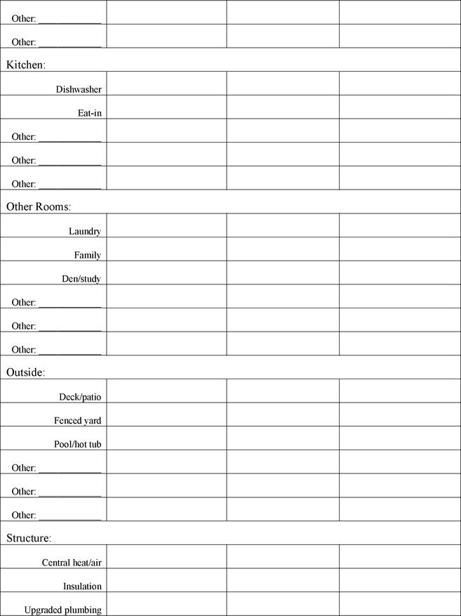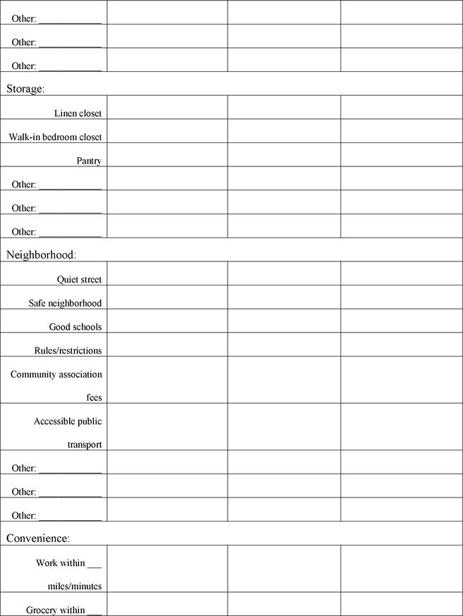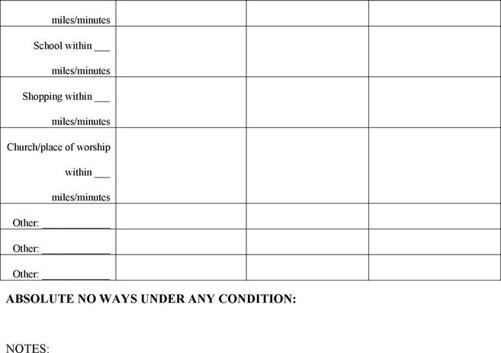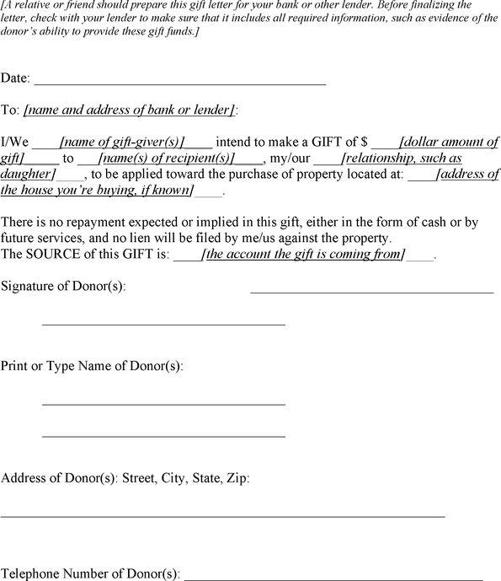Nolo's Essential Guide to Buying Your First Home (93 page)
Read Nolo's Essential Guide to Buying Your First Home Online
Authors: Ilona Bray,Alayna Schroeder,Marcia Stewart
Tags: #Law, #Business & Economics, #House buying, #Property, #Real Estate

BOOK: Nolo's Essential Guide to Buying Your First Home
13.46Mb size Format: txt, pdf, ePub
Other.
NOTES:
Dream List Directions
The Dream List includes the more common features found in many homes, but you can add others to this list (perhaps a must-have hillside location with a view) or delete some features. Add as many details as you want in the left-hand column (“General Features”). At the end of the Dream List, there’s a section for those things you absolutely will not accept, under any condition. There’s also a section at the end for notes, such as comments about a particular house or neighborhood—something you want to be sure to remember, such as a quiet location at the end of a cul de sac.
Fill in the “Must Have” column with your minimum requirements and the “Would Like” column with features you’d prefer but could live without. For example, for the “Number of Bedrooms” feature, you might write “3” in the “Must Have” column and “4” in the “Would Like” column. For some features, you can simply place a check mark to show that yes, you must have or would like that feature (such as a dishwasher). In some cases, you’ll add additional information: For example, you might put a checkmark indicating that a house meets your upper price limit, and then note the actual price of the house. If a “Must Have” can be added when you move in, such as a deck or second bathroom, you can also note this.
If you fill out the left columns of the Dream List now and print more copies, you can use this sheet over and over again. Each time you visit a house, simply write in the address and note how it compares in the right-hand column (“This House”). Save copies for homes that seem like good possibilities.
Dream List




Gift Letter

Private Loan Terms Worksheet

Questions for Seller Worksheet
[Here are some basic questions you and your agent will want to ask about a particular house, in terms of repair needs, utility costs, and neighbors. Add anything else to this list of interest—for example, if you have specific questions about the garden. You’ll most likely ask the seller’s agent these questions, but if the seller is there, or is selling without an agent, ask the seller directly.]
1. How long has the house been on the market? ______________________
2. What repairs have been done in the last few years? ________________________________________________________________What are the house’s major or most immediate repair needs? ________________________________________________________________
3. Does the seller use a particular repairperson, plumber, electrician, or pest control person? If so, please provide their names: _____________________________________________________.
4. How much money does the owner pay for monthly utilities (gas, garbage, electricity, water) and, if applicable, for association fees? $ ______________ $ ______________ $ ______________Are there any other ongoing costs? $ ___________________
5. Has the owner had any problems with water or dampness in the basement or any other part of the house?
6. Is there a furnace and a central A/C system, and if so, when was it installed?
7. How are the neighbors? Are there issues regarding fences, trees, or property lines?
NOTES:
How to evaluate the answers:
1. If it’s more than a few weeks (depending on how fast houses are moving in your market), ask whether there’s been a price drop and whether any offers have fallen through and why. Maybe it’s overpriced and ripe for you to make a lower bid on.
2. Some of these repair problems may be stated in the pest or other inspection report, but it’s helpful to have the agent summarize them for you. Don’t hesitate to be direct and ask things like “Have there been any roof leaks?”
3. Any use of repairpeople can reveal repair issues the seller didn’t mention when answering Question #2. The information will also be useful if and when you move in!
4. If you’re stretching just to buy the house, make sure it doesn’t come with unusually high ongoing costs.
5. The basement and attic are likely suspects here. Moisture problems are hard to repair and hard to insure.
6. Installing a new furnace or A/C can be another major expense—and one that’s important to deal with soon, for the sake of your personal comfort.
7. Difficult neighbors can’t be repaired. Specifically ask about their level of noise; cooperation regarding fence, tree, or parking issues; and any behavioral problems or oddities.
Condo/Co-Op Worksheet
[Here are some basic questions you’ll want to ask the seller, seller’s agent, and neighbors about a particular condo or co-op. Tailor this list according to the particular property (Hawaii homebuyers can delete the question about snow removal!), and add other questions of interest—for example, if you have specific questions about waste disposal or want more details about use of a pool.]
1. Do you enjoy living here? What are the best and worst things about it?
2. What percentage of the properties are rented out to tenants?
3. Are you happy with the community association? Are there any particular problems? What do you wish it would do differently?
4. What exactly is included in your monthly association or maintenance fee? (Some might include heating, parking, storage facilities, and use of the clubhouse, while others charge separately for these services, if they’re available at all.)
5. Where is your parking? Indoor? Outdoor? Reserved? Private garage?
6. What amenities are included in your membership (for example, a club house or laundry room)? Are there any waiting lists?
7. Are any special assessments planned? When was the last one? What was it for?
8. What taxes can you expect—for example, local school taxes?
9. For co-ops: How much is the mortgage on the property itself? (This may affect your monthly maintenance fees and whether they are deductible because they pay the underlying mortgage.)
10. In the event of snow, by what time can you expect it to be shoveled or plowed? Does this include parking areas?
11. Are there any annual surcharges, such as for fuel?
12. How high is the reserve fund (of emergency money)?
13. Who determines how much is spent on various things?
14. Are meetings of the board or association open or closed? How do members or shareholders have input into decision making (for example, by submitting questions in advance of meetings)?
15. If people will be living above you, is there a rule saying the floor must be carpeted? Are the walls well insulated?
16. Are any of the neighbors difficult or inconsiderate?
17. How are package deliveries handled in the building if there’s no doorman?
18. Do you have a right to sublet your unit?
19. Are there many vacancies in the building or development? How long does it take for the average unit to sell—are they in demand, or does it take a while?
20. When are workpeople allowed to enter and work on your unit? Saturdays, Sundays, evenings? Must they be licensed?
21. What kind of repair or construction work can be done without the approval of the association or board? What’s the procedure for approval? How long does approval usually take?
Other books
Emily's Vow by Betty Bolte
Loved by You by Kate Perry
Kismet by AE Woodward
Thicker than Blood - Book One by Olivia Leighton
Remember by Eileen Cook
The Dark Inside by Rupert Wallis
The Executioner's Song by Norman Mailer
The Experiment by Elliot Mabeuse
Taste Me Deadly (Sensory Ops) by Duncan, Nikki
The Gendarme by Mark T. Mustian
